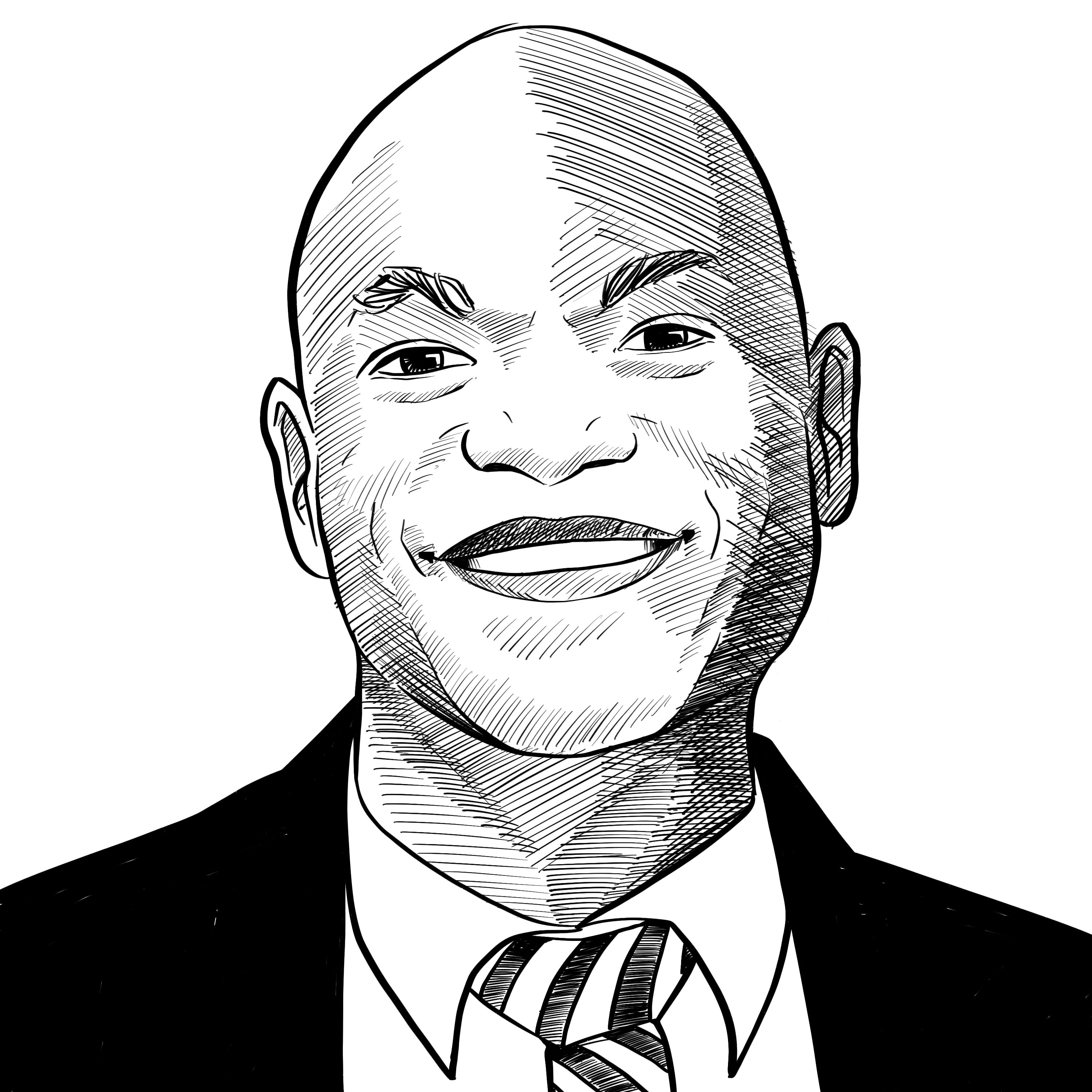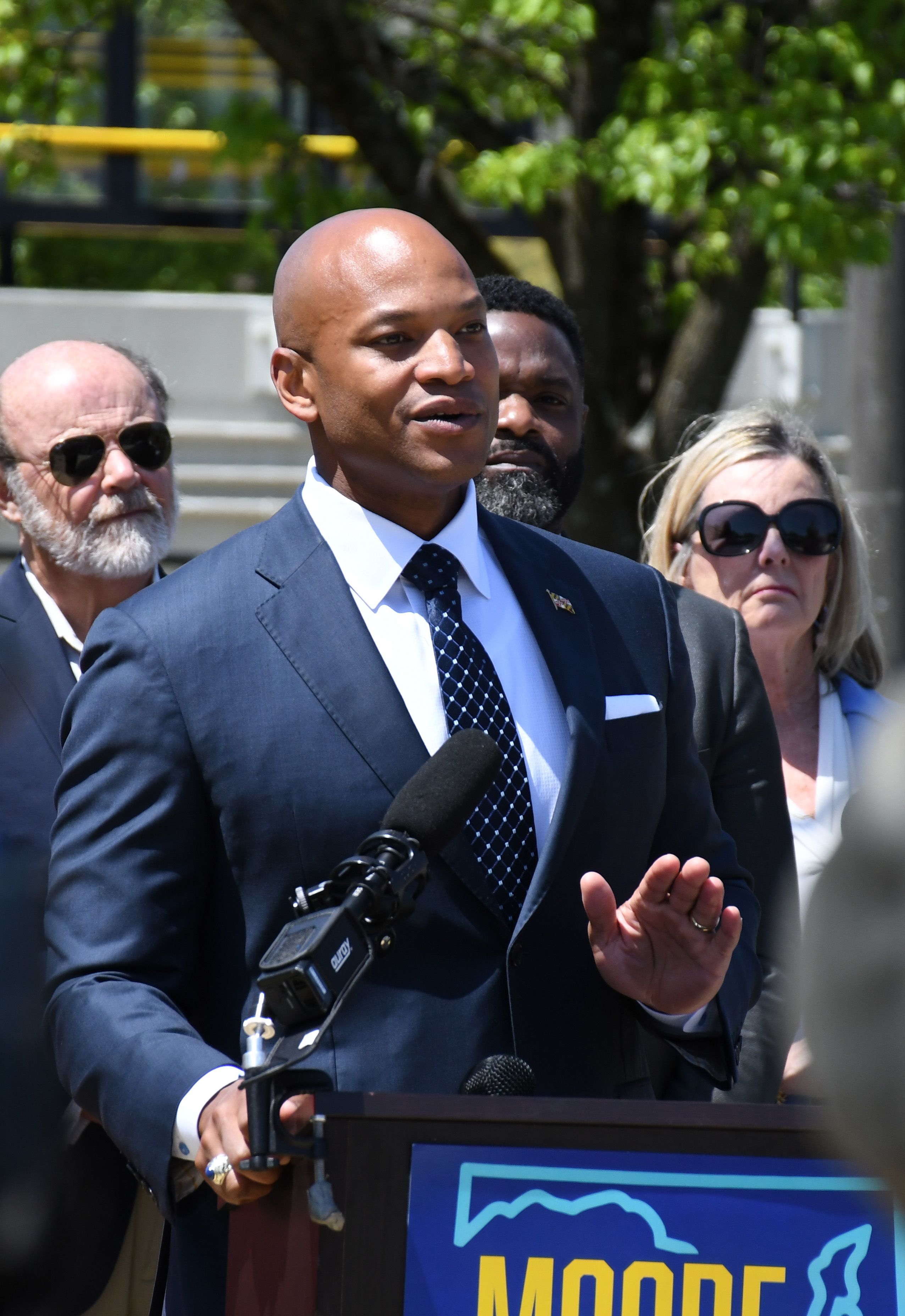Wes Moore
Democrat

(John Baker for The Baltimore Banner)
(John Baker for The Baltimore Banner)
- Age: 44
- Resides: Baltimore
- Experience: Military veteran, author and entrepreneur. Associate’s degree from Valley Forge Military Academy. Bachelor’s degree in international relations and economics from Johns Hopkins University. Rhodes Scholar, earning master’s degree from Wolfson College at Oxford. Former investment banker for Deutsche Bank and Citigroup, founder of BridgeEdU education company in Baltimore, former CEO of the Robin Hood Foundation in New York City, best-selling author of “The Other Wes Moore,” White House Fellow in the U.S. Department of State in 2006-2007, reached the rank of captain in the U.S. Army. Has never held public office.
- Personal: Married with two children
- Candidate website
- Read The Baltimore Banner's profile of Wes Moore
- Listen to Wes Moore on "On the Record" on WYPR Radio
- Read more election coverage
Running mate:
Aruna Miller
- Age: 57
- Resides: Montgomery County
- Experience: Civil engineer and politician. Immigrated to the United States at age 8. Bachelor’s in civil engineering from Missouri University of Science and Technology, 1989. Traffic engineer in Los Angeles County, Calif. and Montgomery County, Md., 1989-1994. Montgomery County transportation planner, program and project manager, 1996-2011. Represented Montgomery County in the Maryland House of Delegates, 2010-2019.
- Personal: Married with three children
- Listen to Aruna Miller on "Midday with Tom Hall" on WYPR Radio.
Questionnaire:
Jump to key issues:
Both the state government and local governments are required to make significant investments in public education under the Blueprint for Maryland’s Future. (Also known as the Kirwan plan.) How would you ensure that these financial commitments are met?
We have an opportunity to ensure every child in Maryland has access to a world-class public education. My top priority will be fully funding and implementing the Blueprint because failing to create a world-class public education system isn’t just failing our children, but our future as well. I recognize that there are local jurisdictions that are challenged by the increase to the local share under the Blueprint and as the next governor, I will bring every jurisdiction to the table to make the decisions that need to be made, to fund and implement the Blueprint together. I’m proud to be endorsed by Maryland’s teachers because they know I won’t stop fighting until every child has the opportunity to succeed.
Do you believe that Maryland public schools teach about human sexuality and gender in age-appropriate ways?
Yes.
Would you suggest changes to those lessons?
As a parent to two school-aged children myself, I want what every parent wants: for them to grow up to be the best they can be. I would never want my children to be unable to be free in their own skin or told they don’t belong. These issues are being addressed at the local level, but this is how I will think through and respond to issues such as this. As Maryland’s next governor, I would bring everyone — parents, teachers, students, everyone — to the table to develop solutions that are in the best interest of our students.
Are you satisfied with the ways Maryland schools teach the history of Indigenous, Black, Latino, Asian or other communities of color and systemic racism?
Our classrooms need spaces for our students to develop into critical thinkers. And as a Black man who was trained on military bases named after confederate generals, I believe we have to love our country enough to tell the hard truths about its history. Our incredible educators have been trained to teach our children, and I trust their ability to teach challenging topics in age-appropriate ways.
Do you support Maryland’s BOOST program that uses state tax dollars to fund private school tuition?
No.
Would you change program funding?
[Candidate’s response in bold.]
- Increase
- Maintain
- Decrease
- Eliminate
As governor, how would you view your role and the state’s role in reducing violent crime in our communities?
Baltimore is the city where I live, where I came of age, and where my wife and I are raising our children. I love this city, and as governor, I will be committed to its safety and future. Maryland deserves a leader who thinks holistically about the crime and violence plaguing our city and our state and who will take a proactive and serious approach to Marylander’s safety. I’m proud to be the first candidate to release a comprehensive public safety plan because I recognize keeping people safe is the first and highest responsibility of any chief executive. I believe in policing with absolute accountability and appropriate intensity, bringing together federal, state, and local resources together to stop and prevent crime. When I am governor, I will act swiftly and with urgency to keep Marylanders safe.
What steps would you take to assist Baltimore authorities in preventing violent crime in the city and holding offenders accountable?
Rising crime is a statewide problem and it will require statewide leadership to fix it. In 2020 alone, Maryland had 573 homicides and over half of them came from just one jurisdiction: the City of Baltimore. So it’s essential that the state pays special attention and focuses on what’s happening with the violence in Baltimore, and this is where the state needs to play a bigger role. Recently, I called on Governor Hogan to take immediate action to combat violent crime in Baltimore by moving to immediately fill the more than 100 vacancies at the Department of Parole and Probation (DPP), providing support to Baltimore’s new Firearm Intelligence Unit, supporting the immediate expansion of a City-wide shooting review board, developing and implementing new risk assessment tools, funding additional slots for youth to participate in after school and job programs, and increasing support for crisis intervention teams.
To reduce crime, should the state invest more money in:
Choose all that apply
[Candidate’s response in bold.]
- Crime prevention and diversion programs
- Community programs such as education, youth services and job training
- Staffing and training for police officers
- Staffing and training for parole and probation officers
- Increasing the number of prosecutors
Would you propose changes to Maryland’s gun control laws?
Yes.
People are dying in our streets and families are being torn apart. It doesn’t have to be this way - and that is why I am running for governor. I know that if we have a governor who will take these issues seriously and come to the table with ideas instead of a pointed finger, we can make progress. Our administration will take a comprehensive, data-driven approach to gun violence prevention, bringing together federal, state, and local law enforcement agencies, as well as community members and local organizations. We will invest in proven community-based violence intervention programs that will target and interrupt crime. We will also have a particular focus on getting ghost guns off the street. Finally, we will work with law enforcement agencies to create a firearms database to track firearms used in crime and better enable law enforcement to analyze and solve gun crimes.
Do you support changing state tax laws to require high-earning Marylanders and corporations to pay more?
There’s nothing in my plans that calls for raising taxes. My number one priority if elected governor will be making our state more competitive and also more equitable. Right now, Maryland has the 7th highest unemployment rate out of any state in the country, and we’re ranked as the 34th best state for business—and our most vulnerable populations are bearing the largest tax burdens. As governor, I will work in partnership with the legislature to reform our tax code and make it more streamlined, focusing on the goals of making it easier to start and grow a business in Maryland, making our state more attractive to businesses from elsewhere, and making it easier to raise a family. We will explore the expansion of a permanent Earned Income Tax Credit and Child Tax Credit and eliminate certain annual business filing fees for small businesses while closing tax loopholes for large corporations.
How would you spend additional revenue?
To take Maryland to the next level and ensure that when we compete, we win, we must build stronger economic infrastructure that creates opportunities for everyone. That means leveraging the billions in federal dollars flowing into Maryland to invest in early childhood education and our child care infrastructure, drive students into STEM fields, attract world-class talent and industries to Maryland, support our small businesses, and create transportation infrastructure that gets Marylanders to work, school, and other community assets. Collectively, these policies will result in generational returns on our investments and allow us to grow and strengthen our economy.
Maryland is sitting on a budget surplus of more than $1 billion. Would you spend some of that money, and if so, how would you spend it?
We have a $2.5 billion budget surplus and a massive equity deficit. Budgets aren’t just monetary, they’re moral. Our growth can and must be inclusive. My administration will capitalize on every asset at our disposal to address educational disparities, lack of access to transportation, child care, and environmental justice while creating pathways to work, wages and wealth for every Marylander.
Would you invest more state resources in Baltimore?
Yes.
We cannot have a strong Maryland if we do not have a strong Baltimore. Baltimore is the city where I live, where I came of age, and where my wife and I are raising our children. I love this city, and as governor, I will be committed to its future. As governor, I am committed to ensuring that the Red Line is built and connected to other forms of transportation, fully funding and implementing the Blueprint for Maryland’s Future to give every child a world-class education, and directing resources to prevent the crime and violence plaguing our city.
Should Maryland do more to ensure minority-owned businesses have a fair opportunity to secure state contracts or business?
Yes.
What is your position on Question 4, which would legalize adult recreational use of marijuana?
Yes.
If Marylanders vote for marijuana legalization, what are the top issues related to legalization that you would focus on?
We must take steps to address the destruction the war on drugs has inflicted on many Maryland communities, and people of color in particular. I support the legalization of recreational cannabis and if the people vote in favor of this ballot measure, we must also begin the process of reconciling the impacts of criminalization, including automatic expungement for low-level possession charges, evaluating employment restrictions for cannabis-related convictions, and ensuring Black-owned cannabis businesses are given meaningful opportunities in this new industry.
Would you propose changes to the ways Maryland limits, regulates or funds abortion?
Yes.
Maryland lawmakers set aside money in the budget to fund training in abortion care for doctors and medical professionals. Gov. Larry Hogan has declined to release the funding. Would you release the funding?
Yes.
How would you seek to improve Maryland’s public health system to handle future health emergencies based on what’s been learned during the coronavirus pandemic and the monkeypox outbreaks?
Health care is a basic human right that every Marylander deserves. Our communities and environment must also support overall health. As governor, I will work to strengthen the infrastructure of our state and local governments so that we can support the people whose health has been dramatically impacted by these diseases and develop the resources needed to ensure that we can more efficiently respond to future pandemic challenges. I will also work to ensure we are supporting our health care workers as well as training the workers of the future. Additionally, I will ensure that we are uplifting our state health care leadership and work with all stakeholders to ensure that we are addressing Maryland’s current and future public health needs.
Do you agree with the scientific consensus that global climate change is influenced by human activities?
Yes.
Climate change poses an existential threat to our state and is the biggest risk to our economy, health, and safety. Failed leadership from the top has impeded progress and left hundreds of thousands of Marylanders at risk. We cannot afford to sit back any longer and allow the effects of climate change to continue harming and damaging our communities. A released a comprehensive policy plan to address climate change, and some of my key initiatives include promoting equitable access to electric vehicles and charging infrastructure, ensuring that Maryland generates 100% clean energy by 2035, and appointing a chief sustainability, mitigation, and resilience officer to ensure strong public-private collaboration, measure our progress, and ensure accountability to our goals.
Chesapeake Bay-area states are unlikely to meet a 2025 federal deadline for making significant improvements to the health of the bay and its tributaries. What policies would you pursue to help the bay and meet the deadline?
The Chesapeake Bay is our greatest natural resource, generating billions in annual economic impact and supporting key industries like tourism, fishing, crabbing and more. We’ve made progress due to the Chesapeake Clean Water Blueprint, but we have a lot of work left to address worsening pollution. I released an extensive climate change plan which included my call for fully funding the Bay Restoration Fund and leveraging federal infrastructure funds to upgrade stormwater and wastewater management systems so we can combat nutrient pollution. I’m also going to work to ensure other states are held accountable to meet our shared goals, because Maryland cannot do this work alone.
Please describe your position on Gov. Larry Hogan’s plan to expand highways in the D.C. metro region with privately built and operated toll lanes?
I understand the congestion issues on I-270 is a serious issue that must be addressed and will thoroughly examine any transportation project through a lens of equity in construction and access, environmental impact and justice, and strong community input. I am opposed to the plan for I-270 and I-495 as proposed by the Hogan administration and oppose the toll lanes as proposed in the current P3 plan but we cannot throw this plan out and start from square one. The bottom line is we have to find a path forward on I-270 and the American Legion Bridge that will address congestion and improve access to opportunity, and we have to do it in a way that prioritizes access to transit and protects taxpayer dollars.
Would you continue the project?
The candidate did not answer this question.
Do you support the proposed high-speed maglev train between Baltimore and Washington, D.C.?
I’m not for or against MagLev at this time, and believe that much more research needs to be done to ensure the project doesn’t harm the environment or residents. We do support developing true high-speed rail capacity, connecting Baltimore and Washington with efficient, high-speed rail that would open up housing, employment, and office real estate between the two hubs. Our administration will focus on a variety of options to bring high-speed service to this vital corridor, including working with Amtrak to remove the bottlenecks and curvature limitations on the Northeast Corridor.
Should Baltimore and surrounding counties create a regional transit authority to have more control over public transportation decisions?
Regional transportation authorities can be useful and I am open to a Baltimore Regional Transportation Authority, as long as it focuses on achieving the broader goals of connecting all our state’s assets.
Will you accept the results of the 2022 gubernatorial election as certified by local and state election boards?
Yes.
It is essential that our leaders accept the results of the election and encourage trust in our democratic process and I will always do just that.
Would you propose any changes to the laws governing how voters cast their ballots?
Yes.
We need to ensure that voting in Maryland is easy and safe for everyone. Here in Maryland, we still deal with attacks on our basic democratic rights and values. So we have to fight for support in early voting systems, mail-in balloting, and making sure people can vote without fear of intimidation or retribution. I am proud of the legislature for recently expanding access to voting for voters currently incarcerated for a misdemeanor and formerly incarcerated people, as well as passing a law greatly expanding voter education. As governor, I will stand as a brick wall against any attacks on voting rights and will work to continue the progress of the legislature in making voting rights more accessible.

Wes Moore. (Pamela Wood/The Baltimore Banner)
Wes Moore. (Pamela Wood/The Baltimore Banner)


